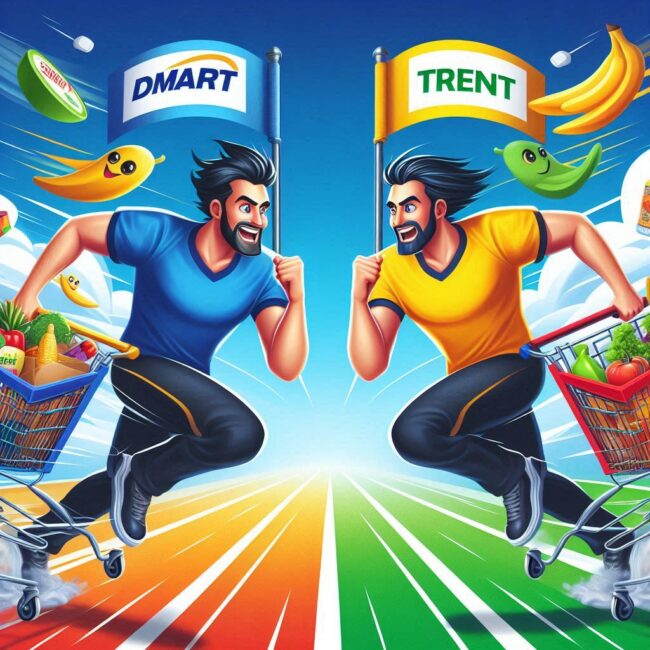
21st Aug 2024, Mumbai: India’s retail industry is a dynamic and rapidly evolving segment of the economy, projected to grow significantly in the coming years. Within this vibrant market, two major players stand out are Dmart (Avenue Supermarts ltd.) and Trent Ltd. So our analysis delves into a comprehensive comparison of these leading companies in the Indian retail sector and will try to answer the question in which stock “Dmart or Trent” you should need to invest your money for future safety?
Overview of the Retail Industry in India
India’s retail industry is on a robust growth trajectory, with projections indicating it will surpass $2 trillion by 2032. This sector is vital to the economy, contributing over 10% of the country’s GDP and employing around 8% of the workforce. It is also a major employment driver, expected to create 25 million new jobs by 2030.
The market for brick-and-mortar retailers remains strong. As the fourth largest retail market globally, India offers vast opportunities driven by a burgeoning middle class, rising urbanization, and increasing consumer spending1. Organized retail space is expanding, now encompassing around 120 million square feet across major cities. This growth accommodates increasing consumer demand in segments like food & grocery, apparel, and consumer electronics, which dominate the retail landscape.
Trent Ltd.
Trent Ltd., a part of the prestigious Tata Group, is known for its popular retail chains like Westside and Zudio, catering to a wide range of fashion and lifestyle needs. Established in 1998, Trent has grown to operate over 435 stores across various consumer categories. The company’s business model focuses on selling private label brands, which has proven to be highly profitable.
- Westside: This chain offers branded fashion apparel, footwear, home decor items, and accessories for men, women, and children. It operates over 200 stores in 82 major cities.
- Zudio: Catering to the value fashion segment, Zudio provides affordable clothing, footwear, and accessories. It has established more than 290 stores nationwide.
- Star: This chain offers a variety of products, including groceries, beverages, health, and beauty products, with 36 stores across the country.
- Stock Performance: Trent’s stock has shown consistent growth, reflecting investor confidence in its business model. As of the latest data, Trent’s stock price is around ₹6,415.
- Price-to-Earnings (P/E) Ratio: Trent’s P/E ratio stands at approximately 125.51, indicating high investor expectations for future earnings growth.
- Revenue and Profitability: Trent reported a revenue growth of 53% year-on-year, with a consistent same-store sales growth (SSSG) of 8-9%. The company’s EBITDA margin is 11%, showcasing strong profitability.
- Market Strategy: Trent focuses on private label brands, which has proven to be highly profitable. The company operates over 435 stores across various consumer categories2.
Trent’s financial performance has been robust, with a revenue growth of 53% year-on-year and a consistent same-store sales growth (SSSG) of 8-9%. The company’s EBITDA margin stands at 11%, reflecting its strong profitability.
Avenue Supermarts Ltd.
Avenue Supermarts Ltd., operating under the brand name DMart, is renowned for offering a variety of products, from groceries to home essentials, at economical prices. Founded in 2002, DMart has rapidly expanded to become one of India’s leading retail chains, with a market value of approximately ₹332,762 crore.
- Product Range: DMart’s product range includes groceries, home essentials, apparel, and consumer electronics, catering to the needs of a broad customer base. DMart’s business model focuses on maintaining low prices and high inventory turnover, which has resulted in a strong return on equity (ROE) of 13.56%. The company’s stock trades at a price-to-earnings (P/E) multiple of 118, also indicating high investor confidence.
- Stock Performance: DMart’s stock is highly valued, with a market cap of approximately ₹332,762 crore1. The stock trades at a price-to-earnings (P/E) multiple of 121.78.
- Revenue and Profitability: For the quarter ended June 2024, DMart reported consolidated sales of ₹14,110.74 crore, up 18.54% from the same quarter a year ago. Its net profit after tax stood at ₹773.82 crore, reflecting a 17.47% year-on-year growth.
- Market Strategy: DMart focuses on maintaining low prices and high inventory turnover, which has resulted in a strong return on equity (ROE) of 13.56%. The company operates large-format stores offering a wide array of products from groceries to home appliances at competitive prices.
Final Verdict:
While it is challenging to provide a definitive answer, our analysis suggests that DMart holds a competitive edge over Trent Ltd. due to several key factors:
Infrastructure and Face Value:
Trent Ltd. In contrast, Trent operates primarily on a rental basis, which can lead to higher operational costs. Trent’s stock has a face value of ₹1.
DMart DMart benefits from owning its infrastructure, which contributes to its operational efficiency and cost management. Additionally, DMart’s stock has a face value (FV) of ₹10, which is generally perceived as more favorable by investors.
Leadership and Management:
DMart is controlled by the highly experienced and renowned investor, Radhakishan Damani. His expertise and local market knowledge provide a significant advantage in navigating the complexities of the retail sector.
Long-Term Investment Potential:
Given the robust business model and strategic advantages of DMart, it is considered a strong option for long-term retail investors. Investing in both DMart and Trent Ltd. over the next 20 years has the potential to yield substantial returns, estimated between 10x to 20x.
DMart’s infrastructure ownership, favorable face value, and experienced leadership make it a particularly attractive choice for long-term investment. However, diversifying investments between DMart and Trent Ltd. could provide a balanced approach, capitalizing on the strengths of both entities in the evolving Indian retail market.
